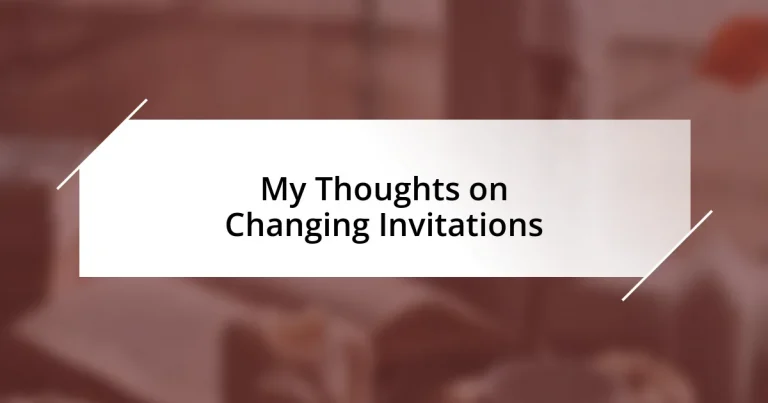Key takeaways:
- Changing invitations can evoke strong emotions; open communication helps maintain relationships and manage expectations.
- Common reasons for altering invitations include schedule conflicts, location changes, and health issues. Embracing these changes with empathy is essential.
- Best practices for updates: notify guests promptly, communicate reasons for changes clearly, and add a personal touch to maintain the event’s significance.
- Creative alternatives like digital invites or themed postcards can enhance guest engagement and excitement around the event.
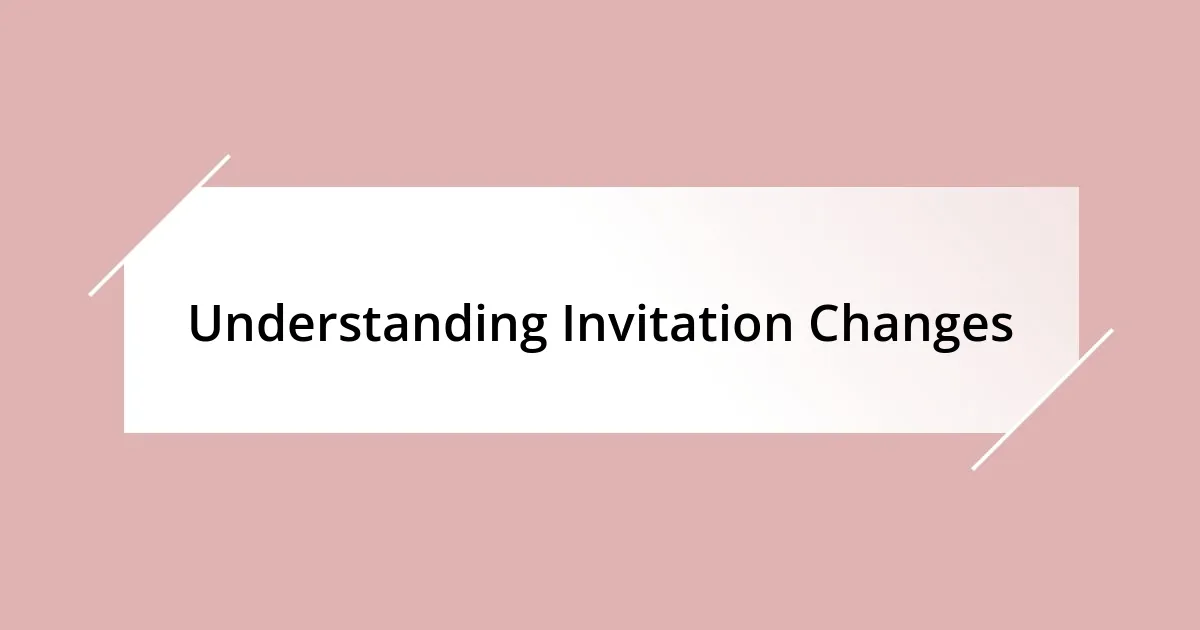
Understanding Invitation Changes
Changing invitations can be a tricky subject because they often carry emotional weight. I remember once sending out a beautifully designed wedding invitation, only to realize later that the date clashed with a family commitment. Had someone told me how common this mistake is, I might have felt less alone in my panic. It raises the question: why do we hold onto the original details so fiercely, even when life dictates a change?
It’s fascinating how a seemingly simple change in an invitation can impact relationships. When I had to revise an invitation for a close friend’s birthday party, I worried she might feel disappointed or overlooked. In reality, she was incredibly understanding and even encouraged me to communicate the changes with clarity and care. This made me realize that open communication often alleviates concerns and strengthens friendships.
The emotional aspect of changing an invitation is significant too. Just think about it: when an invitation goes out, it signifies plans, excitement, and anticipation. So, when changes happen, they can evoke feelings of confusion or sadness. I often ask myself, how can we convey these changes delicately without diminishing the event’s importance? Sharing our reasons and showing genuine concern can soften the blow and keep the spirit of the celebration alive.
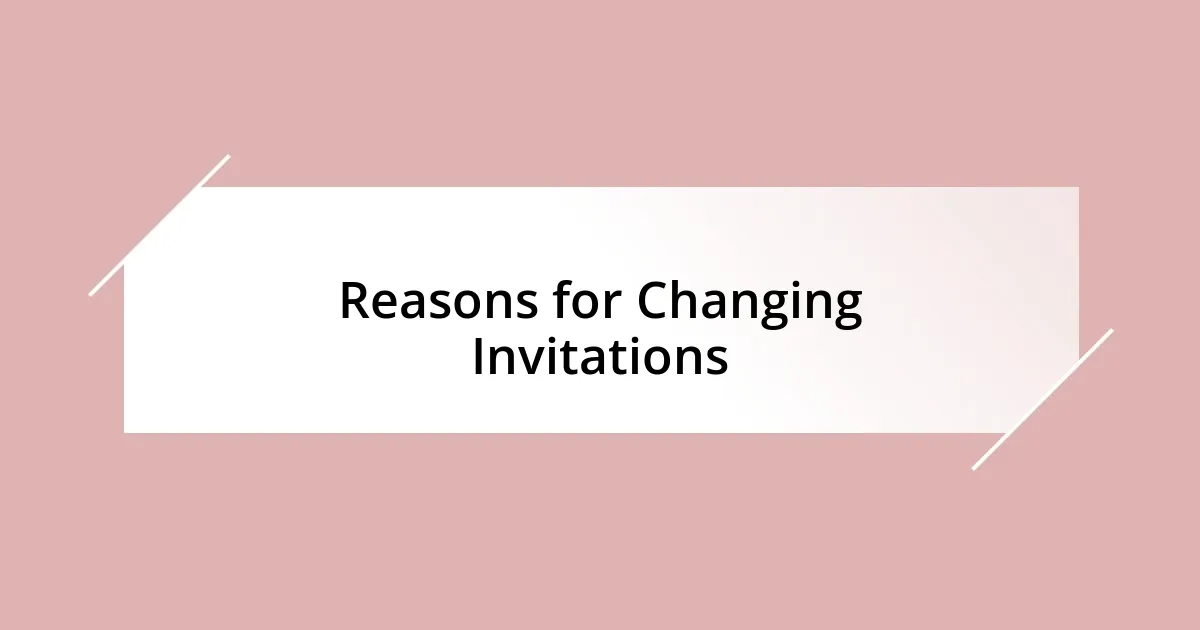
Reasons for Changing Invitations
When it comes to changing invitations, the reasons often stem from unexpected life events that we can’t control. I recall a time when I needed to shift the date of my housewarming party due to a last-minute work obligation. At first, I felt embarrassed about altering the invitation, but I soon realized that life can be unpredictable. Understanding this helps me approach subsequent changes with more empathy.
Here are some common reasons people might change invitations:
- Schedule Conflicts: Personal or professional commitments may arise unexpectedly.
- Change in Venue: Sometimes, the original location becomes unavailable or unsuitable.
- Guest List Adjustments: New attendees or exclusions might necessitate an updated invitation.
- Health and Safety Issues: Especially relevant in today’s climate, changes might stem from health advisories or emergencies.
- Weather Concerns: Outdoor events can be tricky; bad weather often leads to adjustments in plans.
Every time I navigate through these changes, I try to remember that it’s all a part of life’s ebb and flow. I’ve learned that embracing these moments with honesty can prevent misunderstanding and reinforce bonds.
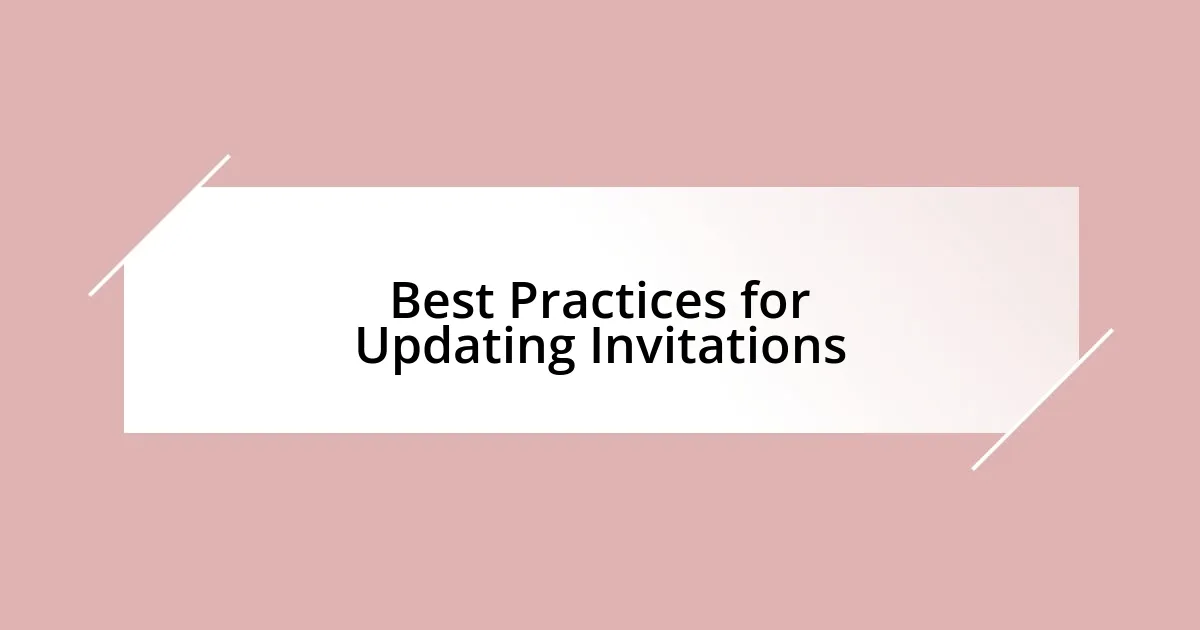
Best Practices for Updating Invitations
Changing invitations is not just about relaying new information; it’s about ensuring that the emotions tied to the event remain intact. When I had to update an invitation for my nephew’s graduation due to a last-minute change in venue, I was anxious about how the family would react. I realized that it was essential to approach the change with warmth, clearly explaining the reason behind it, which ultimately made everyone feel included and respected.
It’s crucial to be timely when updating invitations. I once missed the opportunity to let friends know about a date change for a dinner party, and some arrived a day late. That experience taught me how vital it is to send updates as soon as possible, not only to avoid confusion but to ensure that everyone shares in the excitement of the gathering.
When drafting an updated invitation, being clear and concise is key. I’ve learned that adding a personal touch can make all the difference—perhaps a handwritten note or a heartfelt email. This shows that, even amidst changes, the significance of the event remains a priority for me and my loved ones.
| Best Practice | Description |
|---|---|
| Timeliness | Notify guests as soon as the change occurs to prevent any confusion. |
| Clear Communication | Be transparent about the reasons for the change to foster understanding. |
| Personal Touch | Incorporate a personal note to maintain the event’s emotional significance. |

How to Inform Guests Effectively
When it comes to informing guests about changes to invitations, clarity is essential. I remember a time when I had to tell my friends that a picnic was moving indoors due to an unexpected downpour. I crafted a simple message, mentioning not only the new location but also expressing my hope that everyone would still bring their favorite dishes. This small addition transformed the update into an opportunity to maintain excitement and positivity, even with a sudden shift in plans.
Being upfront about the reasons for changes truly helps foster understanding. I once had to cancel a family gathering because of a health issue, and I feared disappointing everyone. However, when I openly shared the circumstances, my relatives expressed their support and care. It struck me that transparency not only builds trust but also deepens connections during challenging times. Isn’t it amazing how a little honesty can bring us closer together?
Lastly, don’t underestimate the impact of a follow-up reminder. When I switched the date for my book club meeting, I sent a light-hearted reminder a day before the new date. The reaction? A chorus of laughter about how memorable that meeting would now be. Little reminders can help keep the event fresh in everyone’s mind, ensuring that no one slips through the cracks. Have you ever experienced the relief of knowing your guests are in the loop? It’s a wonderful feeling!
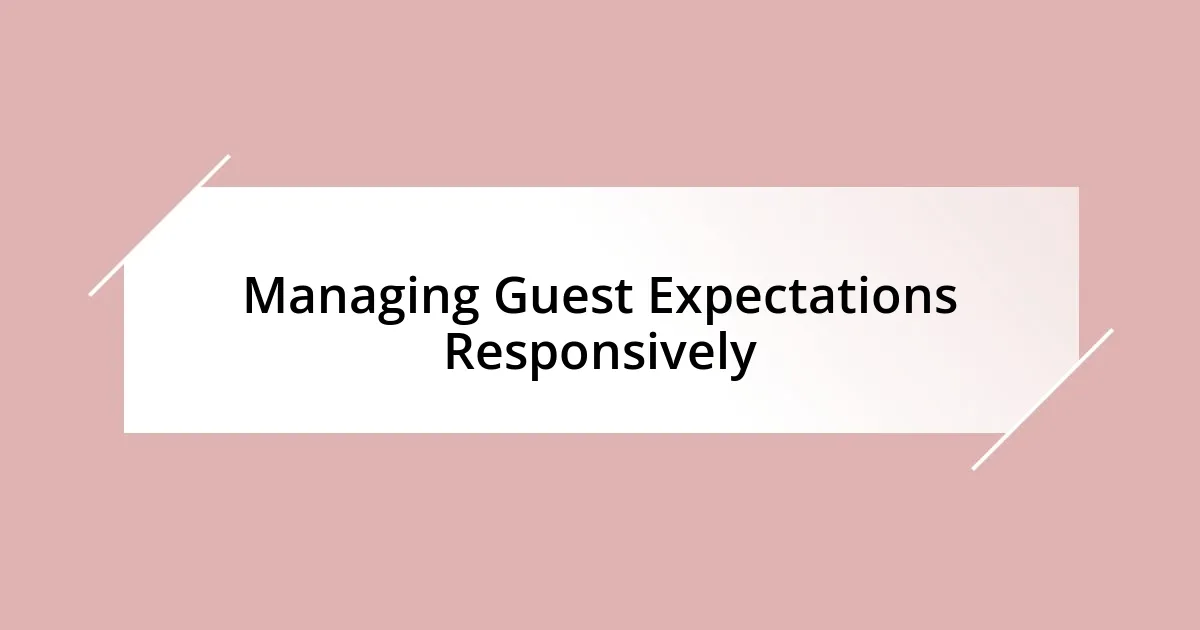
Managing Guest Expectations Responsively
Managing guest expectations responsively requires a thoughtful approach to communication. I recall a situation when I had to change the time of a wedding reception at the last minute. Instead of just sending out a generic message, I made a point to reach out personally to key guests. This not only ensured they felt valued but also encouraged them to share the update with others, creating a ripple effect of information that eased the transition.
Listening to guest feedback is another essential part of managing expectations. A few years ago, when I organized a surprise party, several attendees expressed concern about the venue being too small for everyone. Rather than brushing off their worries, I took their input seriously and began exploring alternatives. This simple act of consideration not only alleviated anxiety but also reinforced the collective excitement for the event.
Lastly, maintaining a positive attitude is vital when dealing with changes. I remember when I had to shift a family reunion planned at a local park to a nearby community center due to unexpected rain. At first, I felt disheartened, but by focusing on how much fun we could still have indoors with games and activities, I encouraged everyone to adapt positively. Isn’t it amazing how a shift in perspective can transform a potentially disappointing situation into an opportunity for joy?
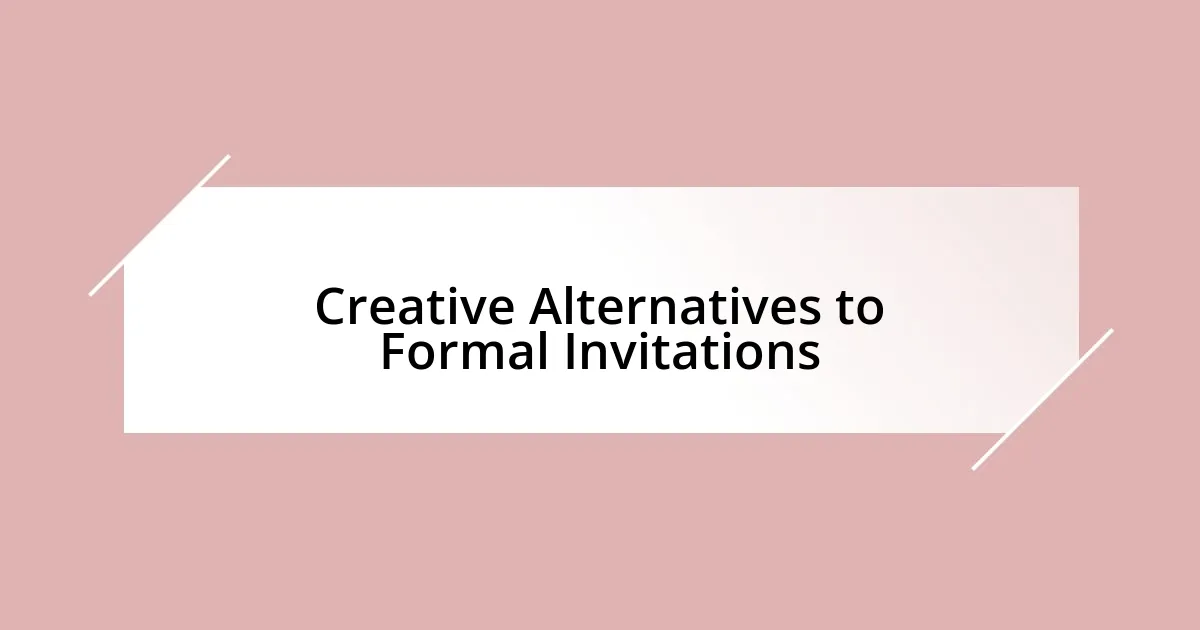
Creative Alternatives to Formal Invitations
When considering alternatives to formal invitations, I’ve found that digital invites can be a refreshing way to engage guests. For my brother’s birthday party, we used a fun online platform that allowed us to create a vibrant video invitation. The moment everyone started responding with animated emojis felt joyful and spontaneous. Have you ever noticed how a bit of creativity can elevate the excitement around an event?
Another creative option is to go with themed invites that resonate personally with your guests. Last summer, I hosted a backyard barbecue and decided to send out personalized postcards featuring each guest’s favorite food. Let’s just say the smiles they wore upon receiving those cards were priceless! It’s fascinating how something as simple as a postcard can make your invitation feel more meaningful and inviting, don’t you think?
Lastly, I’ve experimented with interactive invites that add an element of surprise. For a game night I planned, I included a riddle in the invitation that revealed the time and place. It sparked conversations and generated a buzz among my friends long before the event. Isn’t it delightful when you can turn what could be an ordinary invitation into an engaging experience?
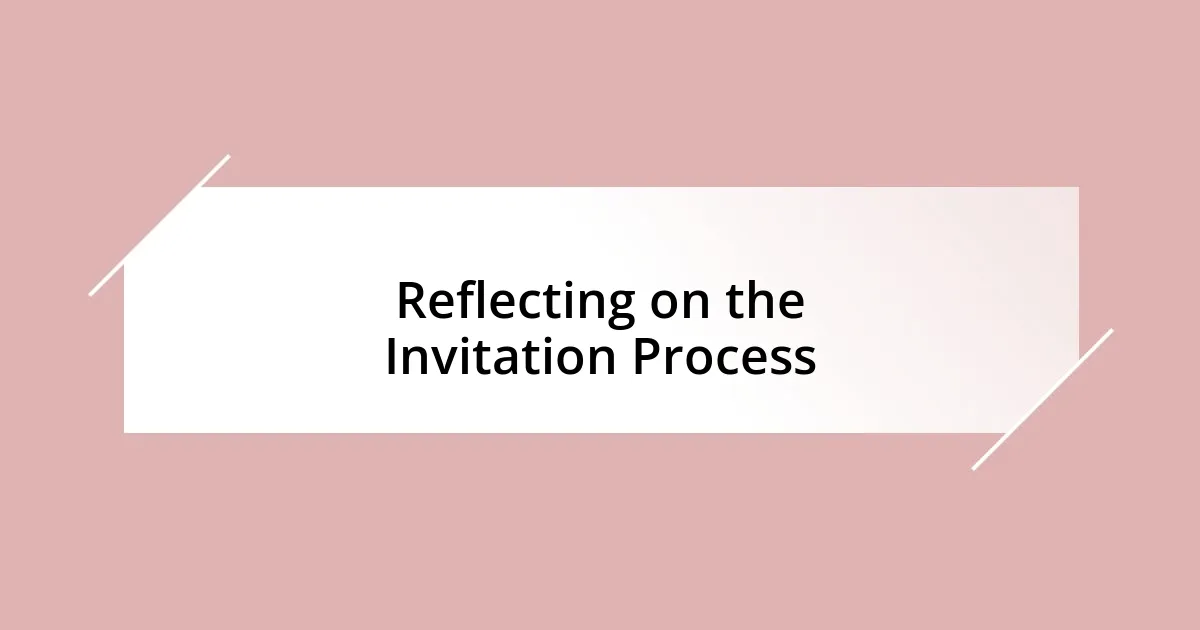
Reflecting on the Invitation Process
Reflecting on the invitation process makes me appreciate just how much thought goes into every detail. For instance, I once crafted a beautifully handwritten invitation for an intimate dinner party. I poured my heart into each letter, hoping that the personal touch would resonate with my friends. Did it? Absolutely! The sheer delight on their faces when they received it confirmed that the effort was worthwhile.
As I think back on different occasions, I remember a time when I overlooked specifying the RSVP deadline on an invitation for a charity event. What followed was a flurry of questions, and a tiny bit of chaos ensued. It made me realize that clarity is just as important as creativity in the invitation process. How often do we underestimate the power of clear communication? It’s a lesson that has shaped how I approach invitations ever since.
Another moment that stands out was when I invited a group of friends to an impromptu movie night. I created a fun graphic using a meme that hit home with my friends. The response was instant; not only did they laugh, but they flooded my messages with excitement. Reflecting on it, doesn’t it show how invitations can become a conversation starter rather than just a notice? That connection makes the invitation process truly special for me.












